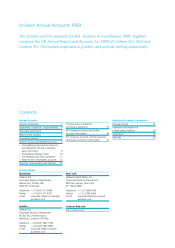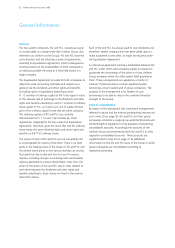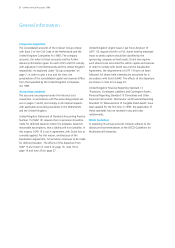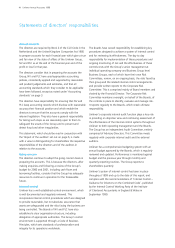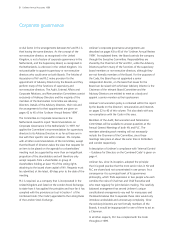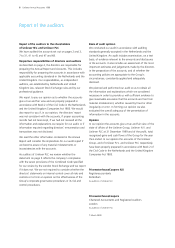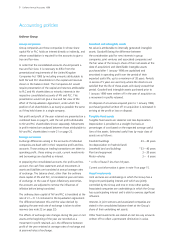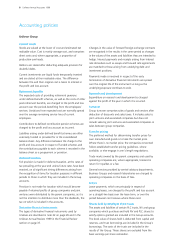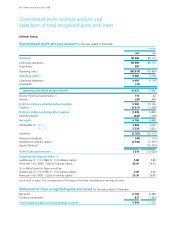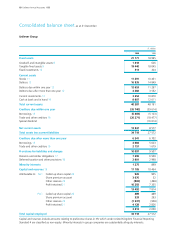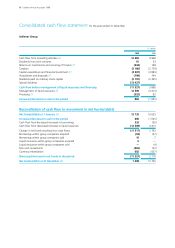Unilever 1999 Annual Report Download - page 5
Download and view the complete annual report
Please find page 5 of the 1999 Unilever annual report below. You can navigate through the pages in the report by either clicking on the pages listed below, or by using the keyword search tool below to find specific information within the annual report.Corporate governance
A vital factor in the arrangements between NV and PLC is
their having the same directors. As the concept of the
non-executive director, as recognised in the United
Kingdom, is not a feature of corporate governance in the
Netherlands, and the Supervisory Board, as recognised in
the Netherlands, is unknown in the United Kingdom, it is
not practicable to appoint supervisory or non-executive
directors who could serve on both Boards. The Articles of
Association of NV and PLC make provision for the
appointment of Advisory Directors by the Boards and they
perform many of the functions of supervisory and
non-executive directors. The Audit, External Affairs and
Corporate Relations, and Remuneration Committees consist
exclusively of Advisory Directors and the majority of the
members of the Nomination Committee are Advisory
Directors. Details of the Advisory Directors, their role and
the arrangements for their appointment are given on
pages 42 to 45 of the ‘Unilever Annual Review 1999’.
The Committee on Corporate Governance in the
Netherlands issued its report ‘Recommendations on
Corporate Governance in the Netherlands’ in 1997. NV
applies the Committee’s recommendations for supervisory
directors to its Advisory Directors in so far as these are in
line with their specific role within Unilever. NV complies
with all other recommendations of the Committee, except
that the Board of Directors takes the view that requests for
an item to be placed on the agenda for a shareholders’
meeting must be supported by more than an insignificant
proportion of the shareholders and will therefore only
accept requests from a shareholder or group of
shareholders holding at least 1% of the voting rights
attaching to the issued share capital of NV. Requests must
be submitted, at the latest, 60 days prior to the date of the
meeting.
PLC is required, as a company that is incorporated in the
United Kingdom and listed on the London Stock Exchange,
to state how it has applied the principles and how far it has
complied with the provisions set out in Section 1 of the
Combined Code (‘the Code’) appended to the Listing Rules
of the London Stock Exchange.
Unilever’s corporate governance arrangements are
described on pages 43 to 45 of the ‘Unilever Annual Review
1999’. As explained there, the Board controls the company
through the Executive Committee. Responsibilities are
shared by the Chairmen of NV and PLC, while the Advisory
Directors perform many of the functions of the supervisory
board members or non-executive directors, although they
are not formally members of the Board. For the purposes of
the Code, the Board has not appointed a senior
independent director, on the basis that issues for the
Board can be raised with whichever Advisory Director is the
Chairman of the relevant Board Committee and the
Advisory Directors are entitled to meet as a body and
appoint a senior member as their spokesman.
Unilever’s remuneration policy is contained within the report
by the Boards on the Directors’ remuneration and interests
on pages 32 to 40 of this volume. This also deals with any
non-compliance with the Code in this area.
Members of the Audit, Remuneration and Nomination
Committees will be available to answer questions at the
Annual General Meetings of both NV and PLC. The
members attending each meeting will not necessarily
include the Chairman of the Committee, since these
meetings take place at about the same time in Rotterdam
and London respectively.
A description of Unilever’s compliance with ‘Internal Control
– Guidance for Directors on the Combined Code’ is given on
page 4.
Unilever has, since its inception, adopted the principle
that it is good practice that the most senior roles in NV and
PLC are shared and not concentrated in one person. As a
consequence it is a principal tenet of its governance
philosophy, which finds expression in two people who each
combine the roles of Chairman and Chief Executive and
who meet regularly for joint decision making. This carefully
balanced arrangement has served Unilever’s unique
constitutional arrangements very well for many years and
the Boards believe that to separate these roles would only
introduce undesirable and unnecessary complexity. Since
the Advisory Directors are not formally members of the
Boards, it would be inappropriate for one of them to act as
a Chairman.
In all other respects, PLC has complied with the Code
throughout 1999.
5Unilever Annual Accounts 1999

